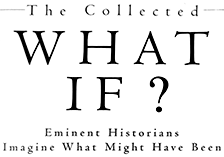 |
| edited by Robert Cowley, 1999, 2001 |
Anyway, a few years back I was up at Ellie’s place—this was when she lived in Portland—and we discovered that the hotel across the street was holding a crazy used book sale: table after table on which everything was a dollar. The Collected What If? is one of the books I picked up. Eight hundred and twenty-seven pages of alternate history essays for a buck? How could I not? And over the course of the past year or so I’ve been slowly working my way through it—a few pages here and there, as the pasta water is coming to a boil or the pizza is in the oven. However, it turns out that the subtitle up there is actually a lie. The eminent historians do not imagine what might have been, for the most part. There are few counterfactual narratives in this book. Much more common is what we see in the essay titled “What If Pizarro Had Not Found Potatoes in Peru?” The author writes about the cultivation of potatoes by Andean civilizations and the way they spread across Europe after the Spaniards brought some samples back. He discusses the advantages that potatoes had over grain, chiefly that because they were kept in the ground until moments before being washed and thrown into a pot, rather than cultivated months or years ahead of time and put into storage, they could not be easily seized by marauding armies, meaning that war in Europe no longer led to famine among the peasantry. He talks about how potatoes became a singular staple in Ireland in particular and thus prompted a diaspora when a fungal infection led to the failure of the potato crop there. So many impacts of the potato’s participation in the Columbian exchange! Okay, author, now paint us a picture of the alternate history! His single concluding paragraph:
So what if Pizarro had not found potatoes in Peru? Our world would be radically different for sure, even though no one can say exactly how very different it would be.
And we see this over and over again—the eminent historians are asked “What if?” and their answer is “I dunno!” Time and time again they spent ten or twenty pages saying, here are the things that happened, and then conclude with a few sentences saying, and if that pivotal moment had gone a different way, why, some of these things might not have happened! An old co-worker of mine with an M.A. in history once told me that historians are trained never to speculate—that it is strictly forbidden in the profession to take a key turning point in the timeline and say that while the real outcome led to this chain of events, the opposite outcome would likely have led to this other chain of events. The latter is counterfactual and thus is not even to be considered, she said. But if that’s your philosophy… why agree to contribute to a book like this?
 |
 |
 |
 |
||
|---|---|---|---|---|---|
Tumblr |
this site |
Calendar page |
|||